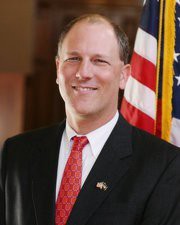A Georgia state lawmaker on Tuesday introduced legislation that would encourage more solar power in the state by making the solar panel purchase process more like buying a car — allowing citizens to lease, rather than buy, solar panels for their homes.
Republican Rep. Mike Dudgeon, an electrical engineer, said the bill would let property owners lease solar panels instead of having to buy them with cash up front. Though the bill if passed may very well result in an increased incentive for people to power their homes with renewable energy, Dungeon says the main reasons for introducing the ill are enabling free-market financing.

“We want to make it clear that you can use whatever financing is available to finance your solar panel,” Dudgeon told the Atlanta Business Chronicle.
Current law in Georgia states that, if citizens want a solar paneled home, they must buy the technology from the state electric utility. Property owners are allowed to arrange financing through banks to buy and install their own solar panels, but they are not allowed to work with companies that are specifically dedicated to both financing and operating the panels for them. Those kinds of financing agreements are permitted in 22 states, according to the Athens Banner-Herald, but the law in Georgia blocks those deals.
Dudgeon insists that his bill would not change the part of that law that gives the state utilities exclusive power providing rights, but would only change the rules for small, individual solar projects. Major power providers would be still be in direct contention with the law if they sought to build or finance their own solar farms. And though the projects opened up to leasing would be small, they would eventually add up to big business for the state’s growing solar industry, according to Jason Rooks, president of Clean Energy Strategies LLC.
“The last few years have seen a drastic drop in prices for solar technology,” he told the Chronicle. “We’re certain that under this [legislation], national and international investment will come to Georgia.”
Georgia’s fight for more solar power is not just about the environmental benefits of reducing emissions from fossil fuels. Solar, as noted by Michael Kanellos in Forbes, has been deemed a property rights issue, pitting private citizens who want to install their own panels against utilities and regulators.
“I believe we need to do everything we can to encourage renewable resources,” Republican state senator Buddy Carter, told Kanellos. “But I see it more as a private rights issue. I don’t like the government telling you what you can or cannot do with your property.”
A spokesman for Georgia Power, the state’s electric utility, told Georgia Public Broadcasting that the legislation is unnecessary, and that current law which prohibits arrangements between private property owners and private energy companies has “served Georgia well.”
While the upfront costs of buying solar panels is expensive, leasing them can be much cheaper and easier to achieve in the short term, according to a recent report in Fox Business. Leasing means consumers don’t have to pay anything up front, the report said, and they don’t have to worry about managing the solar panels.
“It’s a one-stop shop,” Vikram Aggarwal, founder and CEO of online solar panel marketplace EnergySage, told Fox. “Someone shows up at your door, you sign a document and the company will install the solar panels and give you a discount on your current rate, which may be 15% to 30% less than what you are paying.”
However, leasing solar panels may not be as financially smart in the long term. Because the lease companies own the solar panels, they would generally receive the federal tax credit associated with having solar panels, not the homeowner. The homeowner would also miss out on any cash incentives sometimes handed out by states and utilities.
“It’s a good deal if you don’t have the money to put down,” John Rountree, a Connecticut-based solar architect, told the Daily Green. “It may be the only way to go if you don’t have the cash.”
